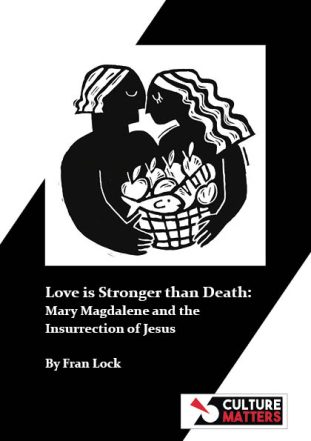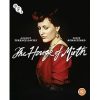
The book is available here
By Father Geoff Bottoms
If the traditional portrayal of Mary Magdalene, as handed down in a patriarchal Church, is that of a fallen woman exemplifying true penitence and faith, then Fran Lock’s challenging yet inspirational poetic meditation on a “love that is stronger than death” is the perfect antidote. For this is no romantic or sentimental love of a woman who knows her place in a man’s world, but a tough love that is sacrificial and unconditional and therefore revolutionary. In fact it is reminiscent of the words of Che Guevara when he wrote:
At the risk of seeming ridiculous, let me say that the true revolutionary is guided by a great feeling of love. It is impossible to think of a genuine revolutionary lacking this quality.
And this is the thrust of Fran’s unconventional, yet thought-provoking and heart-warming style of writing, that brings Mary Magdalene and the historic Jesus of Nazareth to life in a way that impacts on both our political consciousness and praxis.
Mary Magdalene is no passive subject but a woman of agency who follows Jesus in his mission to liberate the oppressed in the class society of his time. Or as Fran puts it in the poem Field Notes on the Kingdom of God, using a term reflecting the way Jesus described his purpose of ushering in a new age of social and economic justice, “the kingdom of god is not a promise, but a possibility. It is an ever-present gift.” But it is a gift to be grasped and lived to the full.
While Fran remains true to the scriptural record, she is totally honest and transparent about her own hesitation when it comes to matters of faith. Her purpose is not to make any claims as to whether there is a supernatural dimension to the narrative, but to stimulate and provoke both heartfelt thought and decisive action in responding to the basic insurrectionary message.
It is insurrectionary because for those with faith, the nature of “God”, however conceived, is one who is on the side of the poor and the oppressed – and therefore the Church is called to follow Jesus in his “preferential option for the poor.” While this can be understood in terms of “God” being the driving force at work within the processes of our material reality, it can also be interpreted by those who do not ascribe to any faith, or who remain agnostic, as the power we manifest within ourselves whenever we struggle in solidarity with the marginalised, the vulnerable, the oppressed and the abused.
Another of Fran’s poems describes this struggle as:
….a ghost in our house; in our sullen / government of tongues, tombs, tomes. / as strong as and stronger than death. /
the spectre. the spectre / of communism – / kid, the spectre is here.
When it comes to the recurrent theme of an unconquerable love in the face of life’s challenges, Fran does us an immeasurable service in addressing the real love between Mary Magdalene and Jesus that is truly human and transformative both on a personal level – and in its rippling effects on others, for the more one loves the more love grows.
Again, in another poem we hear those moving words of Mary when she says:
he / held my face in warm and dusty / hands, and blew the luminous / breath of life into me. i could / not tell his love from my gut-centred / vertigo, love is not just, he said, love is justice, prepares / and precedes justice, creates / the conditions in which justice / can grow.
The true strength of this love is demonstrated by Mary’s commitment to the movement Jesus led, and the strong role she played within it, when she stood by him right to the end as he died in ignominy on the cross, while the male disciples fled the scene. No wonder she was the first to witness his resurrection on that first Easter Day, although even then the disciples dismissed her witness and that of the other women as pure gossip. Right from the beginning it has been the fate of women to be downplayed or airbrushed out of history, yet Mary Magdalene’s revolutionary place in the story is at last being recognised and vindicated.
Fran leaves the whole question of the resurrection of Jesus open, as she speaks of honouring the legacy of the mission of Jesus by continuing his revolutionary programme of a “love that is stronger than death.” He may have met a violent end yet the idea lives on, and you cannot kill an idea, for its power remains to inspire those with a similar love to work to make another world possible.
To quote Fran again:
we / are the resurrection. the hinge / on which the world hangs, / the axis upon which history / turns.
This remarkable and motivational poetic tribute to a woman whose infectious love for Jesus was truly revolutionary deserves to be a classic on any progressive bookshelf, and it cannot be recommended highly enough.















